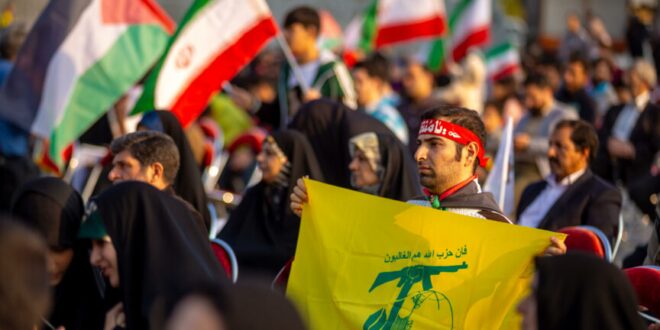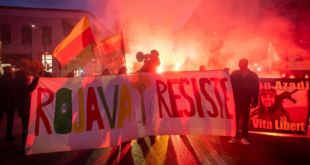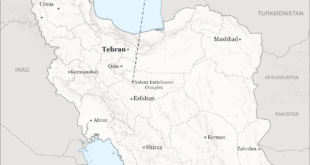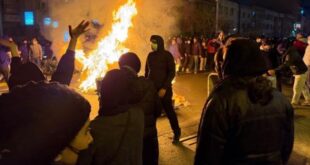The commander of Iran’s Islamic Revolutionary Guards Corps Hossein Salami on Wednesday threatened retaliation after an alleged Israeli strike killed an Iranian adviser in Aleppo, Syria, earlier this week, Times of Israel reported.
In comments made the day after IRGC adviser Saeed Abyar was buried in Tehran, Salami was quoted by Iranian outlets warning that Israel would “pay for the bloodshed.”
According to The New York Times, Abyar was in the IRGC’s expeditionary Quds Force and had been stationed in Syria since 2012. The Britain-based Syrian Observatory for Human Rights said that 16 other members of pro-Iran groups were killed in the strike, which the war monitor attributed to Israel, “including Syrian and foreign fighters.”
“Israel must wait for a response to the killing of Iranian military adviser Saeed Aviar in Syria,” Salami was quoted as saying by Iran’s semi-official Mehr news agency.
“The actions of the martyred will inspire the fighters of the coming generations,” Salami added, according to Iran’s state-run IRNA news agency.
Syrian attacked US embassy in Beirut ‘in support of Gaza’
A Syrian man was arrested after a shooting near the US embassy in Beirut on Wednesday and a judicial official said the assailant carried out the attack “in support of Gaza”, according to The New Arab.
The embassy in the capital’s northern suburb of Awkar “was subjected to gunfire by a person holding Syrian nationality”, the army said on X, formerly Twitter.
“Army personnel deployed in the area responded to the sources of fire, wounding the shooter,” the statement said, adding that “he was arrested and transported to the hospital”.
The US embassy said on X that “small arms fire was reported in the vicinity of the entrance” and that “thanks to the quick reaction” of the Lebanese army, security forces “and our embassy security team, our facility and our team are safe”.
The judicial official told AFP that the gunman, who was wounded seriously, said he carried out the attack “in support of Gaza”, where Israel had launched a military offensive since 7 October, killing over 36,000 people – mostly women and children.
The shooter’s brother, who lives in Lebanon’s Bekaa Valley in the country’s east, was also detained, the official added, requesting anonymity as they were not authorized to speak to the media.
In a separate statement, the embassy said it would remain closed to the public for the rest of the day “but plans to be open for general business as usual” on Thursday.
Lebanese Prime Minister Najib Mikati spoke with army and security service officials who assured him “the situation is under control”, a statement from his office said.
“An investigation is underway to determine the circumstances of the incident and arrest all those involved,” the statement said, adding that US Ambassador Lisa Johnson was currently outside Lebanon.
Jordan Announces Drug Bust Linked to Iran-Backed Networks in Syria
Jordanian authorities have announced their largest drug bust in years at a border crossing with Saudi Arabia, tracing the origin to Iran-linked networks in Syria.
According to officials quoted by Iran International, the Jordanian army has intensified its efforts to combat drug smuggling, especially after recent clashes with individuals suspected of affiliations with pro-Iranian militias.
In January, Jordanian jets conducted four strikes inside Syria targeting suspected farms and hideouts of Iran-linked drug smugglers.
Jordan and its Western allies have attributed the surge in smuggling to Lebanon-based, Iran-backed Hezbollah and other pro-Iranian militias controlling significant portions of southern Syria.
To bolster security measures, Jordan has been promised US military aid, with approximately $1 billion already allocated for establishing border posts since the onset of the Syrian conflict in 2011, as confirmed by Jordanian officials.
Beyond proxies: Iran’s deeper strategy in Syria and Lebanon
The European Council on Foreign Relations published a long study explaining how the war in Gaza is revealing the longstanding shadow conflict between Iran and Israel, with a significant risk of escalating into a broader regional war involving Lebanon and Syria.
The study says that the war in Gaza is pushing the shadow conflict between Iran and Israel out into the open. There is a grave risk that this escalates further in Lebanon and Syria – where Iran wields powerful influence – and spirals into a full-blown regional war.
The intensifying conflict in Syria and Lebanon is the result of Israel’s escalating response since Hamas’s attacks on 7 October and Iran’s “forward-defence” strategy, which aims to confront potential threats before they come close to Iranian borders.
Iran’s strategy, the study adds, is underpinned by a decades-long effort to embed its influence in Lebanon and Syria. Western governments will not find this easy to dislodge, and an intensified coercive strategy to push Iran out of the Levant would likely be counterproductive.
But Iran’s focus on preserving its influence and deterrence capability – which trumps its ideological commitment to supporting Palestinians and fighting Israel – offers opportunities to prevent a wider war.
Europeans should now focus on de-escalating tensions in Lebanon and Syria; increasing conditional support for actors in both countries to advance local stabilization goals; and intensifying their backing for structural reform that can slowly dilute Iran’s dominance.
Key Points of the study:
– Iran’s influence in the Levant is based on a “forward-defense” strategy, aiming to confront threats away from its borders.
– The “axis of resistance” includes allies like Hezbollah, various Syrian militias, and other regional actors opposing US and Israeli interests.
– In Lebanon, Iran’s influence is institutionalized through Hezbollah, which holds significant political power and operates a parallel state structure.
– In Syria, Iran supports the Assad regime and various militias, although its influence is more diffuse compared to Lebanon.
– Iran provides advanced weaponry, training, and logistical support to its allies in Lebanon and Syria, enhancing their defensive and offensive capabilities.
– The formation of local militias and integration of loyal elements into official armed forces are part of Iran’s strategy to maintain its influence.
– Iran’s economic relations with Syria involve significant oil supplies and financial support, aimed at securing strategic economic projects like the transit corridor linking Iran to the Mediterranean.
– In Lebanon, Iran’s economic impact is limited, focusing more on direct support to Hezbollah rather than broader economic engagement.
– Europeans should prioritize de-escalation and stabilization in Lebanon and Syria.
– Increasing conditional support for local stabilization and long-term structural reforms is essential to reduce Iranian dominance.
In general, the study concludes that Iran’s approach prioritizes preserving its influence over ideological commitments, offering opportunities for de-escalation if carefully managed by external actors. European policymakers must recognize the complexity of Iranian influence and avoid strategies that could exacerbate regional tensions.
Economic recovery in opposition-held Syria is challenging but still possible
The Atlantic Council published a paper examining how the ongoing Syrian conflict has necessitated a shift in the approach of both the international community and Syrians themselves towards early recovery and reconstruction alongside emergency responses, bypassing a political resolution. This strategy aims to address the immediate needs of local communities while combating donor fatigue and changing international priorities.
Economic recovery in opposition-held Syria is challenging due to various factors. Easing sanctions or normalizing trade with Syria could strengthen Damascus and undermine peace prospects. Different actors have conflicting goals, with the U.S. promoting development in northeast Syria but hesitating in the northwest, while Turkey fosters growth in areas under its influence but opposes northeast Syria normalization. Russia, Iran, China, and some UN agencies push for centralized reconstruction under the Syrian state.
The international community must balance local economic recovery with ongoing political conversations, resulting in a fragmented recovery framework. The U.S. and its allies can support early recovery in opposition-held areas without undermining UN-led political efforts. Addressing varied interests, ensuring equitable resource distribution, and focusing on sustainable development are critical for building a resilient economic structure that supports peace and stability.
By integrating smart financial solutions, fostering skilled labor markets, and ensuring robust coordination, the international community can support Syria’s pathway towards sustainable development and long-term peace. These efforts are essential for establishing a peaceful and prosperous future for Syria, with continuous monitoring and adjustment of strategies to align with evolving realities and needs.
 Eurasia Press & News
Eurasia Press & News



